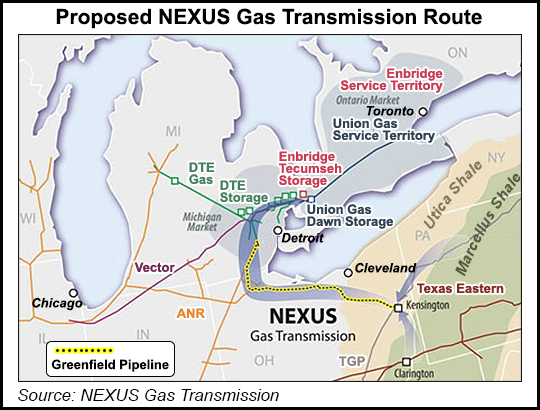Regulatory | Infrastructure | NGI All News Access | NGI The Weekly Gas Market Report
Making Up for Lost Time? Revamped FERC Grants Nexus Certificate
In the first big natural gas decision handed down by the recently reinstated FERC quorum, the Commission issued a certificate Friday authorizing Nexus Gas Transmission LLC to proceed with its proposed 1.5 million Dth/d Appalachian takeaway pipeline.

Nexus, a 255-mile pipeline designed to connect Marcellus and Utica shale production to markets in the Midwest and Canada, drew the short straw earlier this year when other high-profile projects — including the competing Rover Pipeline — received last-minute certificate orders prior to former Chairman Norman Bay’s resignation in February.
The Federal Energy Regulatory Commission spent the next six months without a quorum, leading to delays for Nexus, which received its final environmental impact statement last year.
While they have yet to hold a public meeting, recently sworn-in Commissioners Neil Chatterjee and Robert Powelson, along with holdover Commissioner Cheryl LaFleur, ended Nexus’s long wait for a certificate via a notational order posted to the project docket late Friday [CP16-22].
In the same order, FERC issued certificates for several related project applications, including Texas Eastern Transmission LP’s 950,155 Dth/d TEAL Project, designed to interconnect with Nexus in Columbiana County, OH. FERC also authorized Nexus-related capacity agreements proposed by DTE Gas Co. and Vector Pipeline LP.
Nexus, like Rover, represents a major source of takeaway capacity for Appalachian gas to move east-to-west out of the basin. The $2.1 billion project proposes constructing around 209.8 miles of 36-inch diameter pipeline through 13 counties in Ohio and 46.8 miles of 36-inch diameter pipeline through four counties in Michigan.
The project would also involve four new compressor stations in Ohio’s Columbiana, Medina, Sandusky and Lucas counties.
Friday’s order should come as a relief to backers DTE and Spectra Energy Partners LP (now a subsidiary of Enbridge Inc.). Nexus has faced pushback from landowners along the route and from Michigan regulators, who scrutinized DTE’s capacity commitments to the project, which is about two-thirds subscribed.
DTE management said during a recent conference call that the project, originally scheduled for service this year, is expected to start up in 2018.
© 2024 Natural Gas Intelligence. All rights reserved.
ISSN © 1532-1231 | ISSN © 2577-9877 | ISSN © 1532-1266 |
